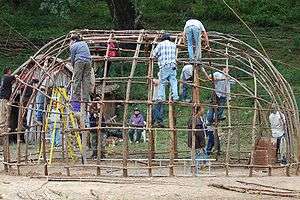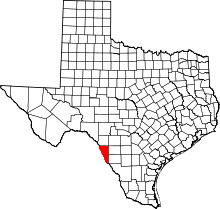Kickapoo Traditional Tribe of Texas
 | |
| Total population | |
|---|---|
| 960 | |
| Regions with significant populations | |
|
| |
| Languages | |
| English, Kickapoo[1] | |
| Religion | |
| traditional tribal religion | |
| Related ethnic groups | |
|
other Kickapoo people and Fox, Sauk, and Shawnee people[2] |
The Kickapoo Traditional Tribe of Texas, based in Eagle Pass, is a federally recognized tribe that uses revenue from its gaming and business operations to provide housing, education and social services to its members. The tribe is a model for other Native American tribes seeking to lift its members out of poverty, because they were living under the international bridge over the Rio Grande as recently as the 1980s.[2]
Reservation
The Kickapoo Indian Reservation of Texas is located at 28°36′37″N 100°26′19″W / 28.61028°N 100.43861°W on the Rio Grande on the U.S.-Mexico border in western Maverick County, just south of the city of Eagle Pass, as part of the community of Rosita South. It has a land area of 0.4799 square kilometres (118.6 acres). There are currently 960 tribal members living on the Eagle Pass reservation and tribal lands in Nacimiento, Mexico, where the tribe often holds ceremonies. Tribal members must be at least one-fourth Kickapoo.
Government
The Texas Kickapoos adopted their Constitution in 1989. They are governed by the Traditional Council, made up of five members elected by secret ballot. The current Council Chairman is Estavio Elizondo Sr., Menikapah. The Tribal Administrator, Jennie Hernandez, runs the day-to-day operations of the Tribe.[3]
Language
The Kickapoo Traditional Tribe of Texas members are related ethnically to the Fox, Sauk and Shawnee tribes. Many tribal members speak English, Spanish and the Kickapoo language, which is a Fox language and part of the Algonquian language family.[1] They also have whistled speech common among Kickapoo Indians in Mexico.
Economic development
Tribal enterprises include the Lucky Eagle Casino and Hotel, which provides Class II gaming, the Lucky Eagle Convenience Store, Kickapoo Empire, which is an 8A business, a pecan farm, ranches located in both the U.S. and Mexico, a gas station in Múzquiz, Coahuila Mexico with PEMEX, and other businesses in Maverick County. Tribal members receive educational, housing, wellness and other social services from the tribe. [4]
History
The Texas Kickapoo’s history is intertwined with that of Texas. According to the Handbook of Texas, the Tribe settled in Texas in the early 1800s at the invitation of the Spanish government, which was hoping native tribes would provide a buffer against American settlement in the region. By 1839, however, most Kickapoos had left Texas for Mexico or Indian Territory as a treaty proposed by Sam Houston was never ratified. The Tribe was granted land in Nacimiento, Coahuila, by the Mexican government in 1852. Tribal members returned to Texas periodically and over the years became seasonal migrant farmers in the U.S. The Tribe was officially recognized by the Texas Indian Commission in 1977 and the federal Bureau of Indian Affairs in 1985, which granted them the 118 acres in Eagle Pass they occupy today.
Notes
- 1 2 "Kickapoo." Ethnologue. Retrieved 12 Sept 2013.
- 1 2 Priztker 420
- ↑ "Tribal Directory." National Congress of American Indians. Retrieved 25 Oct 2017.
- ↑ "Kickapoo Lucky Eagle Casino." Retrieved 7 Nov 2017.
References
External links
- Kickapoo Traditional Tribe of Texas, official website
- Constitution of the Kickapoo Traditional Tribe of Texas Preamble
- Kickapoo Indians, Texas State Historical Association
